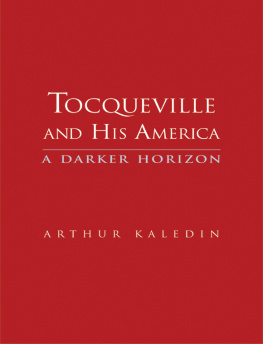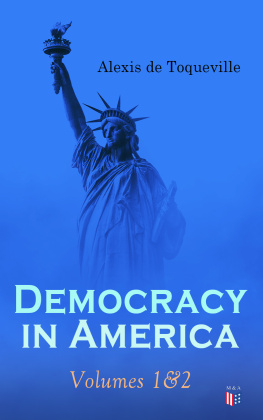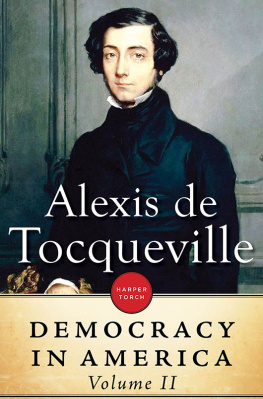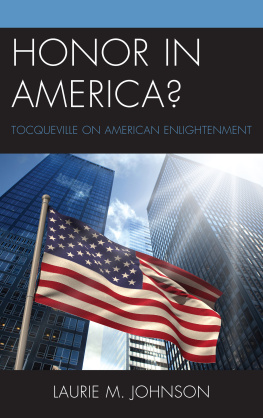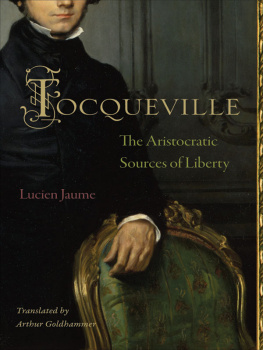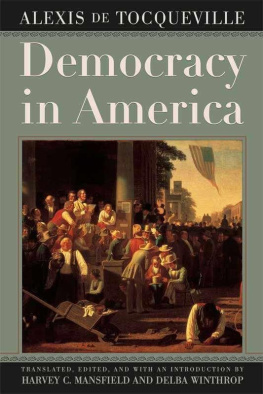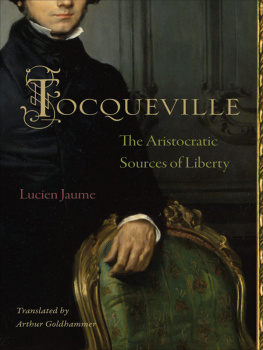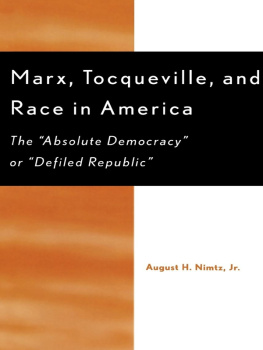Arthur Kaledin - Tocqueville and His America: A Darker Horizon
Here you can read online Arthur Kaledin - Tocqueville and His America: A Darker Horizon full text of the book (entire story) in english for free. Download pdf and epub, get meaning, cover and reviews about this ebook. year: 2011, publisher: Yale University Press, genre: History. Description of the work, (preface) as well as reviews are available. Best literature library LitArk.com created for fans of good reading and offers a wide selection of genres:
Romance novel
Science fiction
Adventure
Detective
Science
History
Home and family
Prose
Art
Politics
Computer
Non-fiction
Religion
Business
Children
Humor
Choose a favorite category and find really read worthwhile books. Enjoy immersion in the world of imagination, feel the emotions of the characters or learn something new for yourself, make an fascinating discovery.
- Book:Tocqueville and His America: A Darker Horizon
- Author:
- Publisher:Yale University Press
- Genre:
- Year:2011
- Rating:3 / 5
- Favourites:Add to favourites
- Your mark:
- 60
- 1
- 2
- 3
- 4
- 5
Tocqueville and His America: A Darker Horizon: summary, description and annotation
We offer to read an annotation, description, summary or preface (depends on what the author of the book "Tocqueville and His America: A Darker Horizon" wrote himself). If you haven't found the necessary information about the book — write in the comments, we will try to find it.
Tocqueville and His America: A Darker Horizon — read online for free the complete book (whole text) full work
Below is the text of the book, divided by pages. System saving the place of the last page read, allows you to conveniently read the book "Tocqueville and His America: A Darker Horizon" online for free, without having to search again every time where you left off. Put a bookmark, and you can go to the page where you finished reading at any time.
Font size:
Interval:
Bookmark:
Tocqueville
and His America
T OCQUEVILLE
AND H IS A MERICA

A Darker Horizon

Arthur Kaledin
Yale
UNIVERSITY
PRESS
New Haven & London
Published with assistance from the Mary Cady Tew Memorial Fund.
Copyright 2011 by Arthur Kaledin.
All rights reserved. This book may not be reproduced, in whole or in part, including illustrations, in any form (beyond that copying permitted by Sections 107 and 108 of the U.S. Copyright Law and except by reviewers for the public press), without written permission from the publishers.
Yale University Press books may be purchased in quantity for educational, business, or promotional use. For information, please e-mail (U.K. office).
Set in Electra type by IDS Infotech Ltd., Chandigarh, India.
Printed in the United States of America by Sheridan Books, Ann Arbor, Michigan.
Library of Congress Cataloging-in-Publication Data
Kaledin, Arthur, 1930
Tocqueville and his America: a darker horizon/Arthur Kaledin.
p. cm.
Includes bibliographical references and index.
ISBN 978-0-300-11931-2 (cloth: alk. paper) 1. Tocqueville, Alexis de, 18051859. 2. HistoriansFranceBiography. 3. Tocqueville, Alexis de, 18051859Philosophy. 4. Tocqueville, Alexis de, 18051859. De la dmocratie en Amrique. I. Title.
JC229.T8K35 2011
320.973dc22
2011008450
A catalogue record for this book is available from the British Library.
This paper meets the requirements of
ANSI/NISO Z39.481992 (Permanence of Paper).
10 9 8 7 6 5 4 3 2 1
To the Memory of
Paul Gagnon
Historian, Teacher, Steadfast Friend Passionate, untiring advocate of the education that our democracy needs if it is to become a fully free and just society
and to
My Sons and Daughter and my Grandchildren who know how to be citizens of a free and just society
I have no doubt that the social and political structure of a nation predisposes a people in favor of certain tastes and beliefs which then flourish carefree, and the same reason, without deliberate striving and indeed almost unconsciously, keeps other opinions and inclinations out of mind.
The essence of the lawgiver's art is by anticipation to appreciate those natural bents of human societies in order to know where the citizens' efforts need support and where there is more need to hold them back. For different times make different demands. The goal alone is fixed, to which humanity should press forward; the means of getting there forever change.
Governments must study means to give men back that interest in the future which neither religion nor social conditions any longer inspire and, without specifically saying so, give daily practical examples to the citizens proving that wealth, renown, and power are the rewards of work, that great success comes when it has been long desired, and that nothing of lasting value is achieved without trouble.
If the citizens continue to shut themselves up more and more narrowly in the little circle of petty domestic interests and keep themselves constantly busy therein, there is a danger that they may in the end become practically out of reach of those great and powerful public emotions which do indeed perturb peoples but which also make them grow and refresh them. Seeing property change hands so quickly, and love of property become so anxious and eager, I cannot help fearing that people may reach a point where they look on every new theory as a danger, every innovation as a toilsome trouble, every social advance as a first step toward revolution, and that they may absolutely refuse to move at all for fear of being carried off their feet. The prospect really does frighten me that they finally may become so engrossed in a cowardly love of immediate pleasures that their interest in their own future and in that of their descendants may vanish, and that they may prefer tamely to follow the course of their destiny rather than make a sudden energetic effort necessary to set things right.
Alexis de Tocqueville, Democracy in America


By the time he finished writing Democracy in America in 1839 Tocqueville's view of the future of democracy, especially its American version, had grown dim. By the 1850s, toward the end of his life, his hopes for America's prospects had become even darker. Why had his once guarded hopefulness faded into pessimism?
While writing Democracy in America he had gradually noted certain qualities inherent in democratic culture and especially American cultureits refusal to acknowledge limits and its tendency to excessthat he feared would in the long run undermine the strengths of mind and character needed to maintain liberty and a truly democratic politics. These weaknesses he discussed in the second volume of Democracy in America, his remarkable exploration of the inner life of democracy that was in effect a second journey to America. (Tocqueville's ideas about democratic culture and politics are discussed mainly in part IV of this book, especially in chapters 79.) Even before 1839 he had noted a strain of violence and lawlessness in American life, both of which by the 1850s were fueling the increasingly violent struggle over slavery as well as the Republic's chaotic economic life. (His thoughts about the growing violence and lawlessness of American life are discussed in chapter 10 of part I and throughout part IV of this book.) These developments further darkened his already dim view of the prospects for the Republic of Liberty he had hoped would disprove the claim of the autocratic powers of Europe that democracy was bound to fail.
This book is a study of the character and thought of Alexis de Tocqueville. Its aim is to see how his life helps to illuminate the meaning and the art of Democracy in America and account for his growing pessimism about the American future. It is a thematic biography that moves from topic to topic, each chapter exploring an aspect of his life and thought. Each chapter is in effect an essay that can stand on its own, but all are linked and present a full portrait of Tocqueville, a narrative of his life, and a fuller understanding of his ever-relevant book. Since Tocqueville the man usually disappears in discussions of his ideas, I have sought to bring him as vividly to life as I can, believing that his ideas and his literary art cannot be fully understood apart from the man.
We are living in the Age of Tocqueville. After a long period of relative obscurity (following his death in 1859) during which he enjoyed the esteem mostly of scholars and intellectuals, his repute began in mid-twentieth century to rise until he has now become a world figure, something of a modern prophet. Democracy in America (1835, 1840) has acquired the uncanny glamour of scripture, cited by all who wish to say something about democracy and its prospects or America and its destiny. It is as if his name were invoked to legitimate arguments by laying on some of the aura of moral earnestness and historical clairvoyance that is part of his peculiar grace. He has even given his name to a school of historical and political thought: Tocquevillian now stands alongside Marxian as shorthand for a mode of social analysis. Unfortunately, the complexity of his analysis has made it possible for ideologues of every persuasion to shanghai him in support of arguments he would have rejected as simplistic.
Next pageFont size:
Interval:
Bookmark:
Similar books «Tocqueville and His America: A Darker Horizon»
Look at similar books to Tocqueville and His America: A Darker Horizon. We have selected literature similar in name and meaning in the hope of providing readers with more options to find new, interesting, not yet read works.
Discussion, reviews of the book Tocqueville and His America: A Darker Horizon and just readers' own opinions. Leave your comments, write what you think about the work, its meaning or the main characters. Specify what exactly you liked and what you didn't like, and why you think so.

